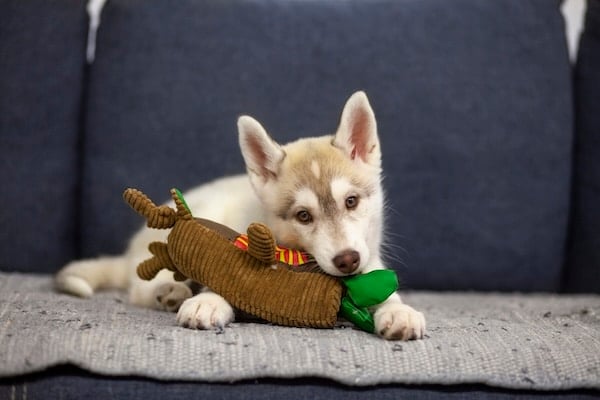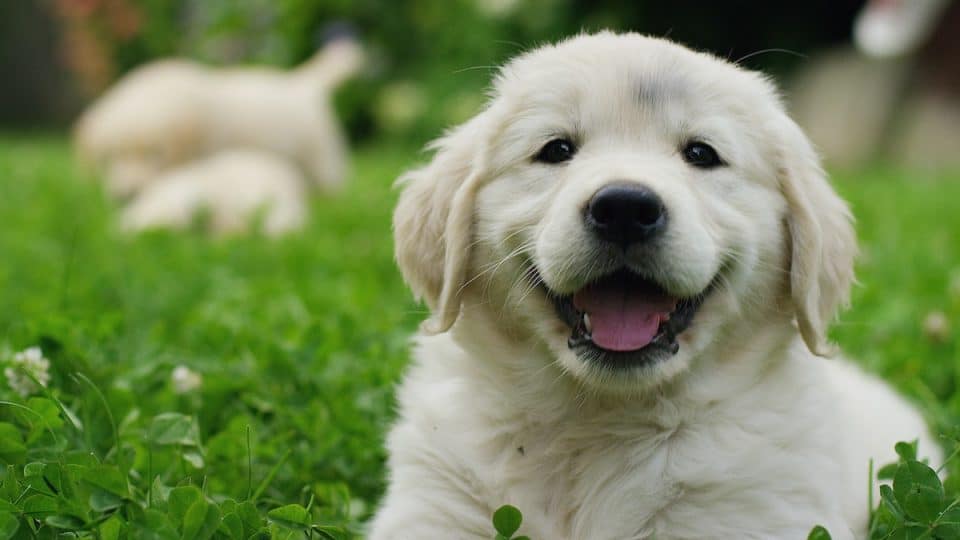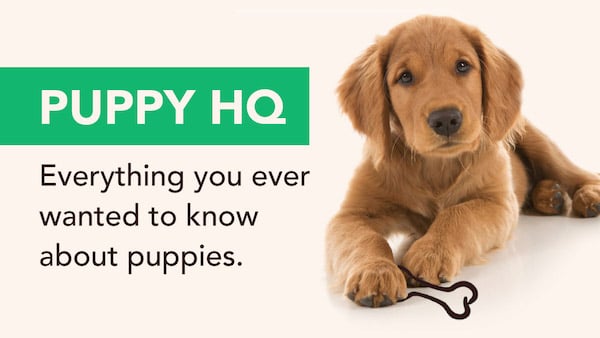- Not a substitute for professional veterinary help.
Are you getting ready to send your puppy to doggy daycare for the first time and wondering what they’ll need? Daycare requirements will vary slightly at each facility and for each puppy, but having general knowledge of what’s expected can help you better prepare your puppy for the first day of drop-off.
To help you get started, we spoke with Dr. Alex Crow, a licensed veterinarian and founder of Pet Health Guru. With his help, we’ve put together a list of everything your puppy may need for daycare, from vaccines and preventatives to familiar toys and safety items.
Puppy Daycare Requirements
As Dr. Crow explains, many dog daycares require puppies to meet certain health and behavioral standards before they can attend. Here are a few things your puppy will likely need ahead of time.
- Vaccines. Your puppy should have their core minimum vaccines before heading off to daycare. These include distemper, parvovirus, adenovirus, and rabies. Usually, puppies complete all their rounds of vaccinations by 16 weeks old. Additionally, many daycares require bordatella (for kennel cough), canine influenza, and leptospirosis. Your vet can advise when your puppy is ready for these vaccines.
- Age. Because of the vaccine requirements, many puppy daycares will not take puppies until they reach a certain age, usually four months or older. Some even require that the puppies be spayed or neutered by a certain point to reduce any potential conflict or injury between play groups.
- Parasite preventions. Puppies will likely need to be on flea and tick prevention before they start daycare. Even if the facility doesn’t require this, it’s a good idea to help keep your dog and home safe from pesky parasites. Ask your vet if you have questions about which treatments are most appropriate for your puppy at different life stages.
- Temperament test. Most daycares require your puppy to be able to socialize appropriately with other dogs. Many offer a trial period with new puppies to check their temperament, see how they interact with other pups and staff, and assess their overall level of comfort while at daycare.

Sergeeva via iStock
Puppy Daycare Essentials to Pack
Preparing a few items to send with your puppy can help ensure a safe and more pleasant experience. Here are a few things your puppy may need at daycare.
- Detailed instructions, such as training cues your puppy knows and what they’re working on, your pup’s sensitivities, the number of feedings each day, any medications that need to be administered, etc.
- Emergency contact information for you, a secondary contact, and your dog’s veterinarian.
- A leash and collar with up-to-date tags for pickup and drop-off. Some daycares may require puppies to wear a quick-release collar while at their facilities. Others may take them off entirely. Each daycare will have its own set of safety rules, so check ahead of time.
- Food and treats your puppy can have throughout the day, especially if they’re following a specific diet. Pre-measure the food ahead of time and place them in an easy-to-transport container or labeled ziplock bag.
- Familiar bedding or toys, if allowed. A comfort item, like a blanket or favorite puzzle toy, can help your puppy adjust to being away from home and at daycare.
How To Ensure Puppy Daycare Goes Smoothly
Dr. Crow has several tips for setting your puppy (and you!) up for success before, during, and after daycare.
Work on socialization
As you prepare to bring your puppy to daycare for the first time, try to expand their socialization training. The more new, safe, and positive experiences they have in different places, with different people and dogs, the more it will help them feel less anxious at daycare.
Establish a regular routine
Additionally, Dr. Crow recommends establishing a good routine with your puppy before starting daycare. Keep a consistent schedule for feeding, exercise, and rest.
Get basic training down
Basic training can also help your puppy prepare for daycare. Teaching them simple cues like knowing their name and coming when called can help daycare staff manage them throughout the day.
Start with short visits and praise
During your first visits, you may find shadowing or doing short trial runs at the puppy daycare helpful so your puppy can adjust to the new environment with you by their side.
Be sure to communicate clearly with the staff about your puppy’s needs and preferences to ensure they have a positive experience at daycare. Short visits can also help get your puppy in the habit of staying somewhere else while learning that you’ll always come back to get them.
After you pick them up, give them praise and continue with your established schedule at home so daycare becomes one part of their overall expected routine.

dageldog via iStock
What if My Puppy Doesn’t Like Daycare?
While puppy daycare can be a great alternative to leaving your dog home alone, some pet parents may find that it’s not the right fit for their pup. Dogs with special health or behavioral needs—like reactive and anxious pups—may need more personalized care.
Instead, hire a pet sitter if your puppy is still quite young. Or have a dog walker drop in to break up the day if your pup is old enough (and comfortable enough) to be left at home for longer periods of time. Some trainers will also offer puppy day sessions where they take your pup off your hands for an hour or so for training sessions.
Just know that if your puppy doesn’t like daycare, that’s perfectly normal and okay. Over time, you’ll find what works best for your pup!





